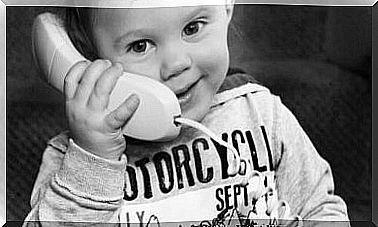Tips To Facilitate Night Weaning

Every child and every situation is unique. However, if you are thinking about weaning at night, here are some tips to help make the process as comfortable as possible for you and your baby
The moment a mother decides to wean her baby from the breast, many doubts arise. In addition, the mother may also be confronted with a number of outside opinions.
However, it is important for mothers to remember that they are the only ones making the decision and that there is no “right” age to wean. Rather, it is a personal choice. However, if you’re ready to wean your child for the night, here’s some advice.
Whether you’re breastfeeding your baby or giving him a bottle, there’s no rush to stop. Because over time, your baby will wean itself from the breast. However, if you are feeling tired, irritable, or think your baby is physically ready for this change, this is usually a good time to start weaning at night .
The nocturnal weaning and questions that come with it
Below are some of the most common questions mothers have about weaning their little ones at night.
How can I tell if my baby is ready?
Every baby is different. If your baby is around 6 months old, this is a good time to start weaning at night. At this point, most babies are getting enough calories during the day to stay asleep for up to 5 or 6 hours.
Of course, that doesn’t mean your baby won’t wake up more often to breastfeed. However, this is more of a habit than a response to a physiological need. Because your baby is used to waking up often to feed. Therefore, it will take time and patience to change this part of his routine.

You should also ask yourself if your baby is trying to bond with you. Because breastfeeding is much more than just food for the little ones.
Some mothers cannot spend much time with their children during the day. As a result, your child may be trying to make up for lost time by connecting with you at night.
Another reason your baby wakes up a lot at night is because their teeth are gradually shooting in. At the same time, your baby may have a different type of discomfort. For example, this could be a cold or some other change in development.
For all of these reasons , weaning your baby gradually, rather than abruptly, is critical. Because this is a time when your baby needs you and needs to feel protected. If you have serious doubts as to whether weaning at night is already the right thing for you, don’t hesitate to discuss this with your pediatrician.
What is the best practice for night weaning?
Below we suggest steps you should take to wean your baby at night.
- Take into account your baby’s feelings. If you choose to wean your son or daughter off the breast, understand that doing so may create frustration for your little one. Therefore, respect your child’s feelings, which are perfectly understandable.
- Don’t deny your own feelings as a mother. It is not uncommon for mothers to experience both guilt and relief while weaning. However, try not to be harsh on yourself.
- Analyze the moment you want to start weaning at night. If you’re moving house, expecting another baby, or starting daycare, this may not be the best time to start weaning. In the midst of a delicate moment or change that your family is going through, it is best to postpone the weaning process until a later date.
- Your baby will need more attention and affection to make up for the absence of breastfeeding.
- Offer your child plenty of food and liquids. If your child wakes up at night and wants to breastfeed, offer them alternatives such as milk, formula, or water.
- Put your baby in his own bed. The excitement of feeling more grown up or sleeping in a different room with a sibling could make the process easier. However, your child shouldn’t consider this an obligation, and you shouldn’t force the matter if there is resistance.
- Include your partner in the weaning process. The process is usually much more effective when fathers understand what this change means for their babies. Fathers should step in to comfort their babies when they are upset and provide distraction, affection, and support.
- If necessary, you should take a step back or stop weaning at night. It’s important to be flexible and make adjustments when things don’t work out. Even if you were sure of your decision, you can always take a step back and, if necessary, wait a little longer before weaning at night.

Nocturnal weaning, according to the experts
There are many experts who have spoken on the subject. First of all, the WHO (World Health Organization) recommends exclusive breastfeeding for the first six months of a baby’s life. In addition, they recommend continuing breastfeeding – along with a supplementary diet – until the children are at least 2 years old.
The pediatrician Richard Ferber addresses this problem in his book Sleep, Child, Sleep – Sleep Problems in Children . Unnecessary waking up several times during the night can lead to sleep disorders, according to Ferber.
Ferber’s theory is that if a child wakes up several times to feed or does so because of digestive problems, it can create a vicious cycle of wanting to eat more.
Finally, pediatrician William Sears emphasizes the benefits of nighttime breastfeeding as it strengthens the bond between children and parents. He therefore encourages parents to refrain from weaning at night or at least postpone it as much as possible – this only applies of course as long as night feeding is not a problem for the family.
In his book Sleeping and Waking – A Parents’ Book for Children’s Nights , Sears provides strategies on how to help your baby fall asleep and feed them in bed to make night-time breastfeeding easier for parents.
In summary, these are only suggestions and opinions. As with any other parenting decision, the decision about when and whether to wean your baby at night is yours alone. So do what you think is best for you and your baby.









